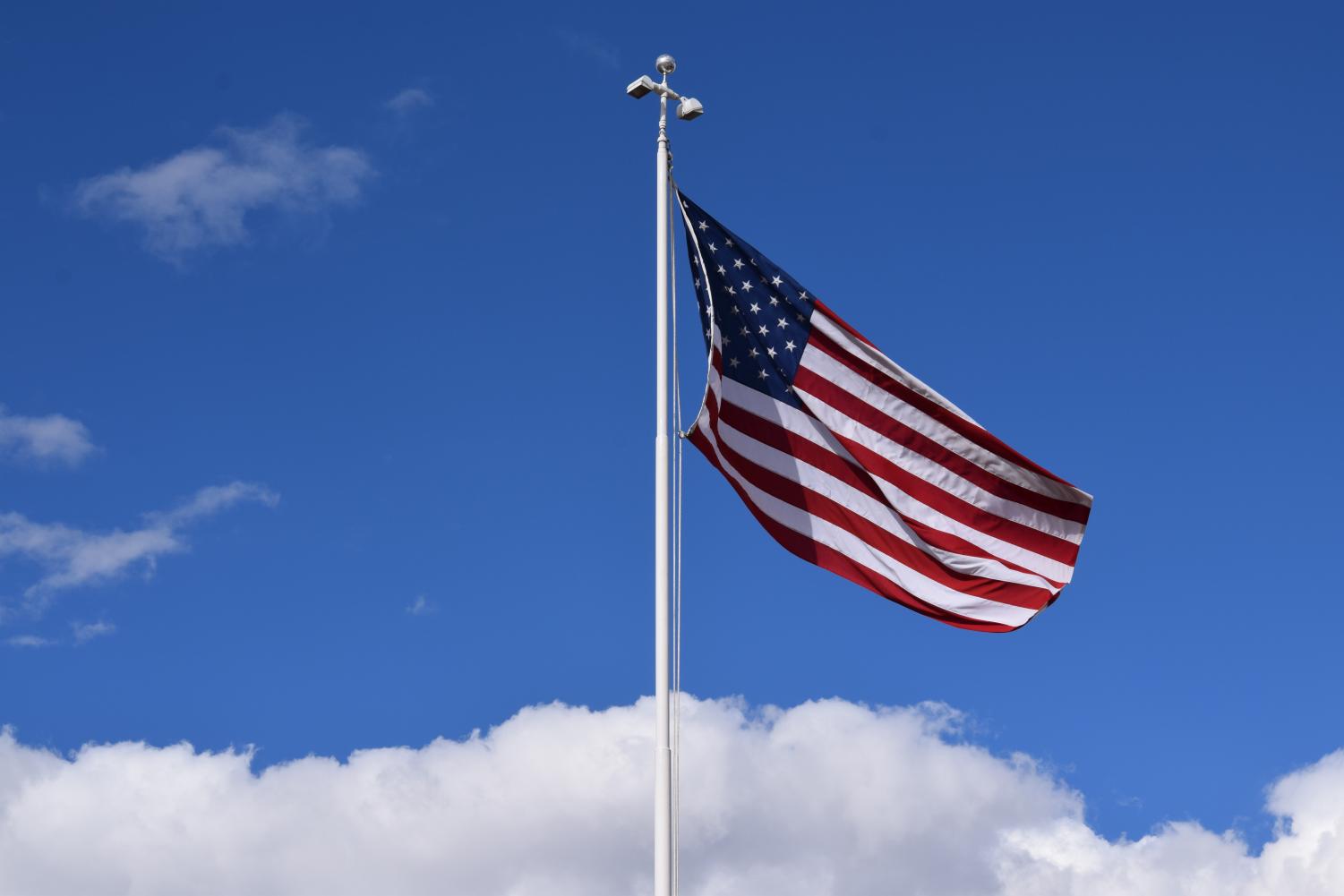The Pledge of Allegiance in Schools (Opinion): Does the Pledge invoke Christianity in a way that is disrespectful? (Part 2)
March 2, 2021
Two writers from The Mav Student News have chosen to explore opposing arguments on the topic of standing for the Pledge of Allegiance in public schools. The following is part two of a three-part series. Click here to read the first part and here to read the third part.
As always, opinion articles are the views of the writers themselves and do not represent an official stance of the student newspaper, Mead High School, or the Saint Vrain Valley School District. We intend for these articles to work together to equally present both sides of an important issue.
With religion so deeply ingrained in the government of the United States, the reference to God in the Pledge contains more nuance than whether it’s a simple constitutional violation. Debating the Pledge means debating religious values and their incorporation in our nation’s traditions. The following opinions further discuss two perspectives on this debate.
The Pledge upholds common values that need not involve Christianity
Many avoid reciting the Pledge of Allegiance due to one word: “God”. It has been argued that this word violates their rights, specifically their First Amendment rights; however, the truth is that our nation — the United States of America — contains, in its very foundation, this one word and faith in God.
The word “God” can be seen in the early organizations of the government and in government today, from the Declaration of Independence to whether or not a person will tell the truth in court.
The Declaration of Independence was written to announce the separation of the American colonies from Great Britain. In the very first part of the document, it uses phrases like “Laws of Nature” and “Nature’s God”. Thomas Jefferson then goes on to state these famous words: “We hold these truths to be self evident, that all men are created equal, that they are endowed by their Creator with certain unalienable Rights.” The base of the very respected Declaration of Independence clearly states the words “God” and “their Creator”. While our constitution protects our right to exercise religion, this does not undermine our responsibility to honor our forefathers’ intentions and values.
Furthermore, when a witness is called up to testify in court, the witness places their hand on the Bible and swears to tell the truth and nothing but the truth. This is also a way to promise to value the beliefs of the Founding Fathers and how they believed the country should be run and its importance. Around the time of the creation of our nation, swearing upon the Bible was a much more earnest matter, for that individual would be swearing to God that you would tell the truth no matter what. Today it is still important because it illustrates the seriousness of telling the truth in court. It is an American tradition that symbolizes truth and honesty. Just as religious values push for truth and honesty, too. While the Bible may not be seen as the epitome of truth to others, it still represents uprightness and honor.
That’s not all. This faith in God shows up everywhere in the foundational concepts of the United States. This foundation, this word that is part of our Pledge of Allegiance, can be seen everywhere.
The Oath of Office requires a government official to place their left hand on the Bible and raise their right. According to Ben’s Guide (a lesson plan from the American Association of School Librarians), the president must place his or her left hand on the Bible and raise the right while saying, “I do solemnly swear that I will faithfully execute the office of President of the United States and will to the best of my ability, preserve, protect and defend the Constitution of the United States.”
This further demonstrates that God or something particularly religious should not be such an affront to individuals that they choose to disrespect a symbol of our nation. The Pledge of Allegiance does not force a church’s beliefs on states, governments, or schools; it only refers to the country’s original concepts.
The inherent problem with refusing to say the Pledge because it references God is that one would have a problem with the entire make-up of our country if that is their stance.
The Pledge is not a way of madly worshipping an object; it is a means of reminding us of our values. It is a way to adhere to our country’s founding beliefs.
Many that have strong religious beliefs and faith think of the Pledge as a way to pay tribute to God and how He is watching over and protecting people; however, standing for the Pledge of Allegiance can mean something different to others at the same time. The Pledge along with our flag are symbols of life, liberty, and the pursuit of happiness. This does not mean that the government is pressuring people to value the same beliefs; it is simply acknowledging the religious freedom we are so blessed to have.
Lastly, the unintended consequence of disallowing the Pledge because of reference to God in public schools is that it would disrupt a large portion of the American students in this form of practicing their faith. Not all religious students say the Pledge and think of their God every time, but many do.
This word “God” has been written in the very blueprints of our country. Its inclusion in the Pledge also gives respect to the similar morals of truth and honesty that our Founding Fathers valued. Through the Pledge of Allegiance, we acknowledge our forefathers’ intentions.

Skylar Whalen is a senior. She is this year's editor-in-chief. Skylar enjoys painting, singing, and playing softball. She is a huge animal lover and works with dogs outside of school. Skylar plays competitive softball and hopes to play in college. She is excited to help other writers succeed and grow. Skylar can’t wait to work with new people and produce engaging stories for the community around her. She also enjoys having the excuse to write about herself in third person and make her seem interesting.
The Pledge violates Christian values
While many Christians feel strongly about standing for the Pledge, they may not recognize that there are inherent issues with pledging to something or someone that contradicts the foundations of their beliefs.
Growing up as a Christian, I was taught to follow the Ten Commandments, and from what I’ve learned of other denominations, most Christians also believe in doing their best to follow or embody the values of the Ten Commandments. However, many Christians disagree on the proper interpretation of these commandments, but for the purposes of this argument, I’ll go off of my personal interpretation, which hopefully, readers can accept at least some portion of. The second commandment says, “Thou shalt not make unto thee any graven image, or any likeness of any thing that is in heaven above… Thou shalt not bow down thyself to them, nor serve them…” In ancient times, this meant “don’t worship idols”. But when applied to modern times, and all times in general, it really means “don’t value physical objects more than God”. Pledging allegiance to a piece of fabric (especially a piece of fabric with stars, a “likeness of [a] thing that is in heaven above”, if we want to get technical) violates this commandment. And yeah, we also Pledge allegiance to our country, but that’s still not God.
It also violates the third commandment, which says, “Thou shalt not take the name of the Lord thy God in vain.” That means, “Don’t say the name of God willy-nilly.” We say the name of God every day when we say the Pledge, and does anyone say it with consideration and respect? Of course not. We say it because everyone else is and because our teachers tell us to. There are some who actually want to say the Pledge, but if you tell me that you think deeply about your words every single time you do, I don’t really believe you. Anyone who says the Pledge has definitely said the Lord’s name in vain.
And for those students who aren’t Christian or religious at all, saying the Pledge can be invoking a deity they don’t know or understand. Many kids haven’t heard of God when they show up to their first kindergarten class, and I doubt anybody really understands the complex themes mentioned in the Pledge when they don’t know how to read yet. But we still expect all students to say the name of God at the beginning of their classes from day one. If we really value religious freedom, we shouldn’t do this to our youth or our religious institutions.
People from around the world have come here to escape religious oppression in their home countries. Treating religion so lightly as to make it into what basically constitutes a nursery rhyme for non-religious children is disrespectful to those who have sacrificed so much for the right to worship as they choose. Those who know how serious religion truly is. My own ancestors, Mormon pioneers, were driven out of their homes in the midwest because of their faith, in some cases by state militia — and this was in the mid-19th century under the American government, under the First Amendment. They endured starvation, exposure, and the loss of loved ones in search of religious freedom. Religion may not be a big deal for some, but it is a big deal for me and millions of other Americans. I don’t want it pushed on people who don’t understand it.
In general, our country has a big problem with keeping church and state separate. For example, the president is sworn into office using a Bible. Why are we ok with that? Our leaders should be solely focused on honoring and protecting our country, not God. They should be accountable to the American people for their performance as presidents. It’s not like God voted for them. God isn’t even an American citizen. He loves all of His people regardless of their nationality and operates outside of the relatively meaningless establishments that govern our secular world. As a Christian myself, I personally believe that I will have to answer for my actions on Earth on the Judgement Day, and that gives me some motivation to do the right thing, but no one should need the threat of eternal divine consequences to be a good person. Likewise, presidents shouldn’t have to swear to God to be good presidents, and public school students shouldn’t have to pledge allegiance to a flag to be good citizens.
Removing the Pledge from schools would hurt literally no one, while keeping it makes religion a flippant daily routine that violates the commandments Christians strive to follow and embody. If any believer in God thinks they can’t fully exercise their right to religious freedom without the Pledge, they probably need to reevaluate their spiritual life. And if you really feel a need to say it every day, you can easily do it in your head or at home before you leave for school, which shouldn’t be that hard. Obeying our Constitution and honoring our country’s variety of religious ideas isn’t that hard.

Adah McMillan is a Senior. She enjoys reading, drawing, eating candy, playing the piano, listening to musicals, and being right. She is involved in choir, NHS, the MHS Book Club, and SVVSD's Innovation Center. She is excited to do more work in The Mav this year and make the website as perfect as it can be.
You can contact her at [email protected].
